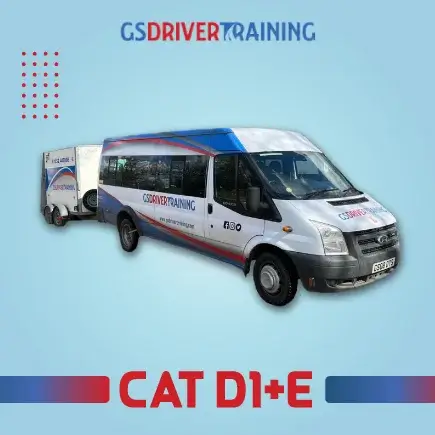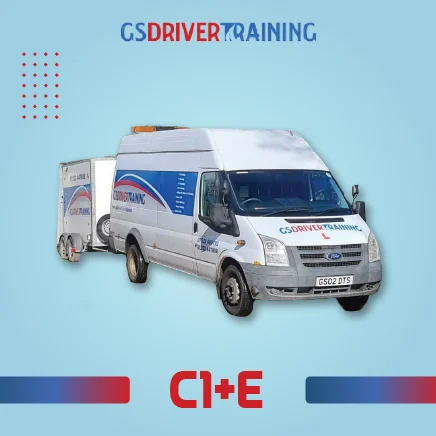
Have you planned to drive a heavy goods vehicle? Of course, you have got your HGV licence, after all. How are you planning to get your driver's certificate of professional competence?
Yes, we know this is why you are here.
You will need a Driver CPC card if you join a company and drive a bus, coach or lorry for them professionally.
Once you have cleared all four parts of your HGV driver training, you will get your licence in a few days. It is not where things end. You will need a Driver CPC if you want to earn.
A driver certificate of professional competence (CPC) is also known as a Driver qualification card (DQC). It was introduced in Europe. It is a qualification certificate if you want to drive an HGV professionally. The aim of bringing this CPC was to support road safety.
In this blog, we will learn how to get your CPC card. Also, we will know about other requirements that you should know about.
To clear your HGV driver training, you need the best training centre. Here are the courses offered by GS driver training.
- 7.5 tonne (C1+E) driving courses with trailer
- Class 1 LGV/HGV courses
- CAT C1
- CAT D
- CAT D1
- CAT D1+E
- Fast Track C+E Course
- Driver CPC courses
How to get your driver certificate of professional competence
To obtain your Driver Certificate of Professional Competence (CPC) card in the UK, you must complete certain training requirements and follow specific steps. The CPC card is required for professional drivers of large vehicles, such as lorries and buses, and it demonstrates that you have the necessary skills and knowledge to operate these vehicles safely and effectively. Here's how you can get your Driver CPC card:
1. Complete Initial CPC Training (New Drivers):
You must complete the Initial CPC training if you're a new driver looking to obtain your initial CPC card. This includes passing a theory test and a practical test. The initial training is divided into two parts:
- Part 1: Theory Test includes multiple-choice questions and hazard perception tests for driving larger vehicles.
- Part 2: Practical Test involves vehicle safety checks and on-road driving.
2. Complete Periodic CPC Training (Renewing Drivers):
You must complete Periodic CPC training if you're already a professional driver and need to renew your CPC card. This training consists of 35 hours of periodic training every five years. This helps you stay up-to-date with the latest regulations, safety practices, and skills required for your role.
3. Choose a Training Provider:
You'll need to choose an approved training provider for both initial and periodic CPC training. These providers offer CPC training courses that are certified by relevant authorities.
4. Attend Training Courses:
Attend the CPC training courses provided by the approved training centre. The initial CPC will involve attending the theory and practical training sessions. You must complete 35 hours of approved training over five years for periodic CPC.
5. Pass the Relevant Tests (Initial CPC):
You must pass the theory and practical tests mentioned earlier to obtain your initial CPC.
6. Submit Application:
You can apply for your Driver CPC card once you've completed the required training and tests. You can do this online through the official government website or by mail.
8. Receive Your CPC Card:
Once your application is processed and approved, you will receive your Driver CPC card in the mail. This Card should be kept with you whenever you're driving professionally.
It's important to note that specific details and requirements might vary, so visiting the official government website for the most up-to-date information on obtaining your Driver CPC card in the UK is recommended. Additionally, consider seeking guidance from your training provider or relevant authorities to ensure you follow the correct procedures.
- Get qualified for your HGV driving licence by clearing all four parts of the test. Once you are through, you can apply for a driver certificate of professional competence.
- After getting your HGV licence, you must complete 35 hours of periodic training. As you get cleared, you will get your driver CPC and can start driving professionally.
- You will get your New CPC card immediately if you complete your training within 12 months (before the deadline).
Key Points to Remember
- If you are driving a lorry, bus, or coach professionally, always remember your driver CPC card at home. There is a fixed penalty of £50 for not caring for the Card on duty.
- If your driving licence address doesn't match your present address, you should get it changed beforehand.
- You will receive your driver's CPC card at the address written on your driving licence. If you do not get it updated, you will have to pay £25.
- If you don't receive your driver CPC card within 20 days of qualification, you can inform DVSA (Driver and Vehicle Standards Agency). If you do not tell them within three months, you will be charged £25.
- If you shift to a new place, you don't need to get your Driver's CPC Card updated, as the address is not mentioned there.
- The sign and photo of your driving licence are used in the Driver's CPC card.
- If you have training in an EU country, you can apply for the driver's certificate of professional competence.
While you are Waiting for your Card
You don't need to wait if you have completed your 35 hours of periodic training but have yet to get the driver CPC card. You can start driving professionally after you complete your periodic training and get the recorded training video from your trainer. You can get the video anytime within five working days after training.
How to get your CPC card from the UK if you have a driving licence from other countries
If you have your HGV driving licence from any other country than Great Britain, you have two options to get a Great Britain Driver CPC card:
- Complete your periodic training in Scotland, England or Wales
- Get your licence exchanged. You should have a code 95 entitlement mentioned on your Non-great Britain driving licence.
Complete your Periodic Training in Great Britain
You can get your Great Britain CPC card if you have completed your periodic training in Scotland, Wales or England.
You must work and live in England if you are from these countries.
- An EU country
- Norway
- Iceland
- Jersey
- Switzerland
- Guernsey
- Isle of Man
- Gibraltar
- Liechtenstein
To apply for a driver CPC card, you must email DVSA (driver and vehicle standard agency) asking for the dorm DQC1.
Get your Licence Exchanged
You have to send your other country's driving licence to DVSA with a short email. It should include:
- Your driving licence number
- Phone number
- Name and address
You will receive your new Driver CPC card with the same number on your licence.
After you complete your 35-hour periodic training in Wales, Scotland and England, you will get the qualification certificate for five years.
So these are some important things you should know before you apply for your Driver CPC card. We hope your question "How to get a CPC card" answers perfectly.
CPC Mod 2
The Driver CPC Module 2 is one of the components of the Driver Certificate of Professional Competence (CPC) qualification for professional drivers of large vehicles, such as lorries, buses, and coaches, in the UK and Europe. The Module 2 test assesses a candidate's knowledge and understanding of various topics related to road safety, driving regulations, and vehicle operation. It is designed to ensure that drivers have the theoretical knowledge necessary for safe and responsible driving of commercial vehicles.
Here are some key points about the Driver CPC Module 2:
CPC MOD 2 Theory
The Module 2 test evaluates a candidate's theoretical knowledge and understanding of road safety, driving regulations, and vehicle operations. It focuses on assessing the candidate's understanding of topics crucial for maintaining safety on the road.
The test covers a range of subjects related to driving commercial vehicles safely and responsibly. The topics include, but are not limited to:
1. Road Traffic Laws and Regulations: Understanding and applying laws and regulations related to road traffic and vehicle operations.
2. Driver Health and Well-being: Knowledge of health and safety regulations, driver fitness, and physical and mental well-being.
3. Safe Loading and Unloading: Understanding procedures for safe and proper loading and unloading of cargo.
4. Safety Procedures: Knowledge of safety procedures in various situations, such as emergencies, breakdowns, and incidents.
CPC Mod 2 test
The Module 2 test is a computer-based test that consists of multiple-choice questions and hazard perception elements. The multiple-choice questions assess the candidate's knowledge of various topics. The hazard perception section evaluates the candidate's ability to identify potential hazards on the road.
Test Centers:
Candidates can take the Module 2 test at approved Driver and Vehicle Standards Agency (DVSA) test centres. These centres are equipped with the necessary facilities to conduct the computer-based test.
Passing Criteria:
To pass the Module 2 test, candidates must achieve a minimum score on the multiple-choice questions and the hazard perception section. The specific pass scores may vary and are determined by the DVSA.
Preparation:
Candidates are encouraged to prepare for the Module 2 test by studying relevant materials and resources. Approved training providers offer programs that help candidates understand the test format, practice multiple-choice questions, and develop hazard perception skills.
Validity:
The pass result for the Module 2 test is valid for two years. This means candidates who pass the test must also complete their practical driving test (Module 4) within these two years to qualify for their Driver CPC card.
Importance:
The Module 2 test assesses theoretical knowledge, complementing the practical aspects tested in other modules of the Driver CPC qualification. It ensures drivers are well-informed about road safety regulations and responsible driving practices.
CPC Mod 4
The Driver CPC Module 4 is a practical demonstration test that is part of the Driver Certificate of Professional Competence (CPC) qualification for professional drivers of large vehicles, such as lorries, buses, and coaches, in the UK and Europe. The Module 4 test assesses a candidate's ability to carry out specific safety-related tasks associated with the operation of these vehicles. It is designed to ensure that drivers have the practical skills and knowledge necessary to ensure road safety and the safe operation of commercial vehicles.
Here are some key points about the Driver CPC Module 4:
Purpose:
The Module 4 test evaluates a candidate's practical knowledge and skills related to safety and vehicle operations. It focuses on essential tasks for maintaining safety while driving large vehicles.
CPC Mod 4 test
The test consists of a series of practical exercises that cover a range of safety-related topics, including:
1. Load Securing: Demonstrating proper techniques for securing cargo to prevent shifting or falling during transit.
2. Vehicle Safety: Conducting checks and inspections to ensure the vehicle is roadworthy and safe for operation.
3. Emergency Procedures: Knowledge of responding to emergencies, including fire safety and evacuation procedures.
The Module 4 test is a practical demonstration rather than a written exam. Candidates must demonstrate their skills and knowledge through practical exercises in a controlled environment. An approved examiner assesses the candidate's performance during each exercise.
Test Centers:
Candidates must take the Module 4 test at an approved Driver and Vehicle Standards Agency (DVSA) test centre. These test centres are equipped with the necessary facilities to conduct practical exercises.
Passing Criteria:
To pass the Module 4 test, candidates must demonstrate competence in all required exercises. The examiner assesses candidates based on their accuracy, safety awareness, and adherence to proper procedures.
Preparation:
Candidates are encouraged to undergo formal training to prepare for the Module 4 test. Training programs offered by approved training providers help candidates understand the test requirements, practice the exercises, and develop the necessary skills.
CPC Mod 4 pass certificate
The pass result for the Module 4 test is valid for 5 years from the date of getting you LGV licences. This means candidates who pass the test must also complete their practical driving test to get the LGV licences if they don't have one at which point the DQC( Driver Qualification Card) will be valid for 5 years.
Importance:
The Module 4 test emphasises the practical skills and knowledge necessary for the safe operation of commercial vehicles. It complements the Driver CPC qualification modules, including theory tests and case studies.
Driver Qualification Card DQC
The DQC (Driver Qualification Card) is a card that serves as proof of a professional driver's completion of the required training and qualifications under the Driver CPC (Certificate of Professional Competence) scheme. The Driver CPC is a qualification that applies to professional drivers of buses, coaches, and lorries in the UK and Europe. It was introduced to enhance road safety and ensure that professional drivers have the necessary skills, knowledge, and competencies to operate large vehicles safely and responsibly.
Here are some key points about the DQC card:
Purpose:
The DQC card is intended to demonstrate that a professional driver has completed the required training and assessments to operate large vehicles legally and safely. It is mandatory for most professional drivers who drive vehicles above a certain weight limit for commercial purposes.
Contents:
The DQC card contains important information about the driver, including their name, photograph, driver number, and the issue date. It also indicates the expiry date of the Card, which corresponds to the date by which the driver needs to complete periodic training to maintain their Driver CPC qualification.
Initial Qualification:
For new drivers obtaining their Driver CPC qualification for the first time, the DQC card is issued automatically once they pass both the theory and practical tests, including the Module 2 and Module 4 assessments. This Card is valid for five years.
Periodic Training:
After obtaining the initial DQC card, professional drivers must undergo 35 hours of periodic training every five years to maintain their Driver CPC qualification. Once the periodic training is completed, the DQC card is renewed, and its validity is extended for another five years from the date of renewal.
Exemptions:
In some cases, drivers may be exempt from the Driver CPC requirement, such as when driving certain vehicles for non-commercial purposes or within a limited range. However, exemptions are specific and should be reviewed in detail.
Penalties for Non-Compliance:
Driving professionally without a valid DQC card when required can result in penalties and fines. Professional drivers need to ensure that their DQC card is up-to-date and valid.
Employers and authorities can verify the authenticity and validity of a driver's DQC card by checking the driver's Card against the Driver CPC database.
Importance:
The DQC card is an important document for professional drivers. It demonstrates their commitment to road safety and their compliance with legal requirements. It also indicates that they actively maintain and improve their skills and knowledge through periodic training.
Remember that information might have changed since my last update in September 2021, so I recommend checking the official government websites or relevant authorities for the most current and accurate information about the DQC card and the Driver CPC scheme.
CPC training, or Driver CPC training, refers to the training that commercial drivers undergo to obtain and maintain their Driver Certificate of Professional Competence (CPC) qualification. The CPC qualification is a legal requirement for professional drivers of large vehicles, such as lorries, buses, and coaches, in the UK and Europe. It aims to ensure that professional drivers have the necessary skills, knowledge, and competencies to operate large vehicles safely and responsibly. CPC training is designed to enhance road safety and driver professionalism.
CPC Training
The primary purpose of driver CPC training is to improve road safety by ensuring that professional drivers are well-trained and knowledgeable. The training covers various topics related to driving regulations, road safety, vehicle maintenance, and professional conduct.
There are two main components of CPC training:
Initial CPC Training
1. Initial CPC Training: New professional drivers must complete initial CPC training before they can drive commercially. This involves passing the Module 2 (case studies) and Module 4 (practical demonstration) tests.
Periodic CPC Training
2. Periodic CPC Training: Professional drivers must complete 35 hours of periodic training every five years after obtaining the initial CPC qualification. Periodic training keeps drivers updated with the latest regulations, safety practices, and industry developments.
Online Driver CPC training refers to training courses for the Driver Certificate of Professional Competence (CPC) qualification delivered through digital platforms. These courses provide a flexible and convenient way for professional drivers to complete their CPC training requirements without attending in-person classes. Online Driver CPC training has become increasingly popular, allowing drivers to learn at their own pace and in their preferred environment.
Here are some key points to know about online Driver CPC training:
Online CPC training allows drivers to access course materials and modules online, giving them the flexibility to study when and where it's most convenient for them. This is particularly beneficial for drivers with irregular schedules or prefer to learn at their own pace. Online CPC training courses cover the same topics as traditional classroom-based courses.
These topics typically include road safety regulations, driving practices, vehicle maintenance, and health and safety. The content enhances drivers' knowledge, skills, and safety awareness. Many online CPC training courses incorporate interactive elements like videos, quizzes, simulations, and case studies. These interactive components help drivers engage with the material and apply what they've learned. Online courses often provide features for tracking progress.
Drivers can see which modules they've completed, their quiz scores, and how much of the course they've finished. Upon completing an online CPC training course, drivers receive a certificate of completion. This certificate proves to have completed the training hours required for the Driver CPC qualification.
Choosing online CPC training courses from approved and reputable training providers is important. Ensure the training provider's courses are certified and recognised by the relevant authorities. Drivers should ensure they can access a stable internet connection and a compatible device (such as a computer, tablet, or smartphone) to participate in online CPC training. Some courses also have specific technical requirements.
Benefits:
Online CPC training offers several benefits, including:
- Flexibility to learn at your own pace and schedule.
- Reduced travel time and costs associated with attending in-person classes.
- Access to a wide range of course topics and providers.
- Ability to revisit and review course material as needed.
Make sure that the online CPC training courses you choose meet the requirements of your local regulations and authorities. Verify that the training provider is reputable and recognised.
Before enrolling in an online CPC training course, it's recommended to research and compare different options to ensure you select a course that aligns with your learning preferences and requirements.
Topics Covered:
CPC training covers a wide range of topics, including but not limited to:
- Road traffic laws and regulations
- Driver health and well-being
- Vehicle safety and maintenance
- Safe loading and unloading
Record Keeping:
Drivers are required to keep records of their CPC training. This includes keeping track of the training hours completed and maintaining evidence of training attendance.
Employers and authorities can verify a driver's CPC qualification by checking the Driver CPC database. This ensures that drivers are compliant with the CPC training requirements.
CPC training plays a crucial role in maintaining a high level of professionalism and safety among professional drivers. It helps drivers stay informed about industry best practices and regulatory changes, contributing to safer roads and responsible driving practices.
FAQ
Q: What is Driver CPC?
A: Driver CPC (Certificate of Professional Competence) is a set of EU regulations to improve the general standard of competency and safety amongst commercial drivers. All drivers must complete minimum periodic training hours (35) to maintain their qualifications.
Q: How many Driver CPC hours do I need to complete?
A: The Driver CPC requires drivers of large goods vehicles (over 3.5 tonnes) and passenger-carrying vehicles (trucks licence category D) to complete at least 35 hours of periodic training every five years. This is known as the Driver CPC periodic training.
Q: How long do I have to keep a Driver CPC valid?
A: Your Driver CPC will be valid as long as you are still driving, and you must hold a valid Driver Certificate of Professional Competence (Driver CPC) for the commercial carriage of goods or passengers.
Q: What are the specific Driver CPC exemptions?
A: There are a few exemptions for certain categories of drivers, such as Bus/Coach drivers, HGV and PCV (passenger-carrying vehicle) drivers. You may also be exempt if you use a vehicle for your private use, if you are a learner driver, or a military vehicle driver.
Q: What are the online Driver CPC options?
A: If you need periodic Driver CPC training, you can also do it online. Online courses allow you to learn at your own pace, using a flexible approach and benefiting from interactive demonstrations, guidance and customised content delivery programmes.
Q: What is the Driver CPC course like?
A: The Driver CPC course is a 7-hour course and is made up of modules that cover the PCV/LGV syllabus. During the course, you will learn about road safety, health and safety, industry regulations and legislation, customer service and communication, customer service, journey planning and driving techniques.
Q: How do I get a Driver CPC DQC card?
A: Once you have completed your periodic Driver CPC training, you will be issued a Driver Qualification Card (DQC). This is usually issued within 28 days of the completion of the training and is valid for five years.
Q: What are 'Vulnerable Road Users'?
A: Vulnerable road users are those most at risk of suffering harm or death when exposed to a road traffic accident. Vulnerable road users are cyclists, motorcyclists, pedestrians, horse riders, and those in wheelchairs or using mobility aids.
Q: What are the benefits of taking online Driver CPC courses?
A: Taking Driver CPC courses online has many advantages: it is more convenient, cost-effective and flexible. You can do it from anywhere. Furthermore, online Driver CPC courses can be a great alternative option if you cannot attend a in-person course.
Q: How do I book an online Driver CPC course?
A: You can easily book an online Driver CPC course by visiting the website of an accredited Drivers CPC training provider. They can provide detailed information on the course content, duration and cost, and details on how to book an online course and payment methods.
Q: Are driver hours and CPC hours the same thing?
A: Driver Hours: Driver hours refer to the regulations that dictate the maximum amount of time that professional drivers of goods vehicles (lorries) or passenger vehicles (buses and coaches) can drive and the minimum rest periods they must take. These regulations are in place to prevent driver fatigue, enhance road safety, and ensure that drivers have adequate rest to operate vehicles safely.
Driver hours regulations cover daily driving limits, maximum driving hours per week, break and rest periods, and weekly rest requirements. Drivers must adhere to these regulations to prevent exhaustion and promote road safety.
CPC Hours (Certificate of Professional Competence Hours): CPC hours, often periodic training hours, are required for professional drivers to obtain and maintain their Driver CPC qualification. The Driver CPC is a qualification mandated for professional drivers of large vehicles in the UK and Europe. It includes initial CPC training for new drivers and periodic CPC training for existing drivers.
Periodic training courses involve completing 35 hours of training every five years to ensure drivers stay updated with industry developments, regulations, safety practices, and driving skills. These courses contribute to enhancing drivers' professional competencies and road safety awareness.
In summary, driver hours relate to the legal regulations governing driving and rest periods. In contrast, CPC hours pertain to the training hours required to obtain and maintain the Driver CPC qualification. Both aspects are essential for maintaining road safety and professionalism among commercial drivers.
Also Read: How to get a PCV Licence









